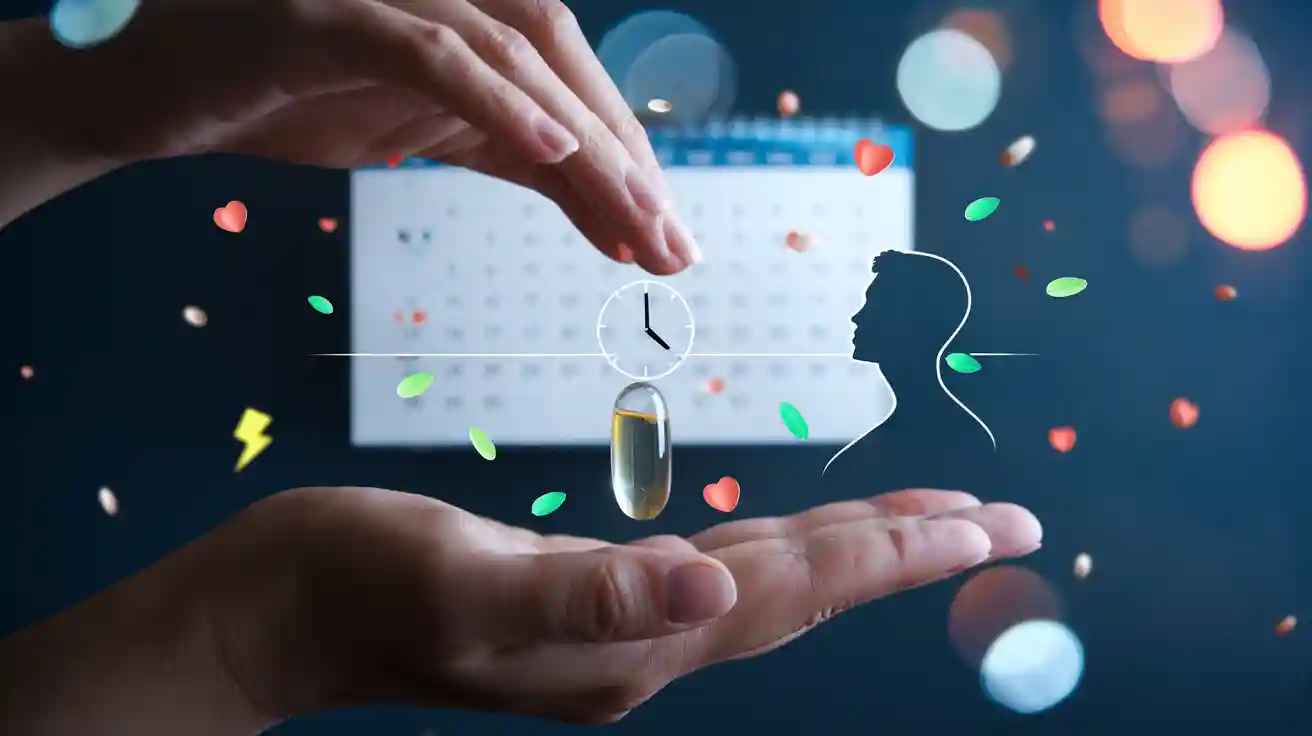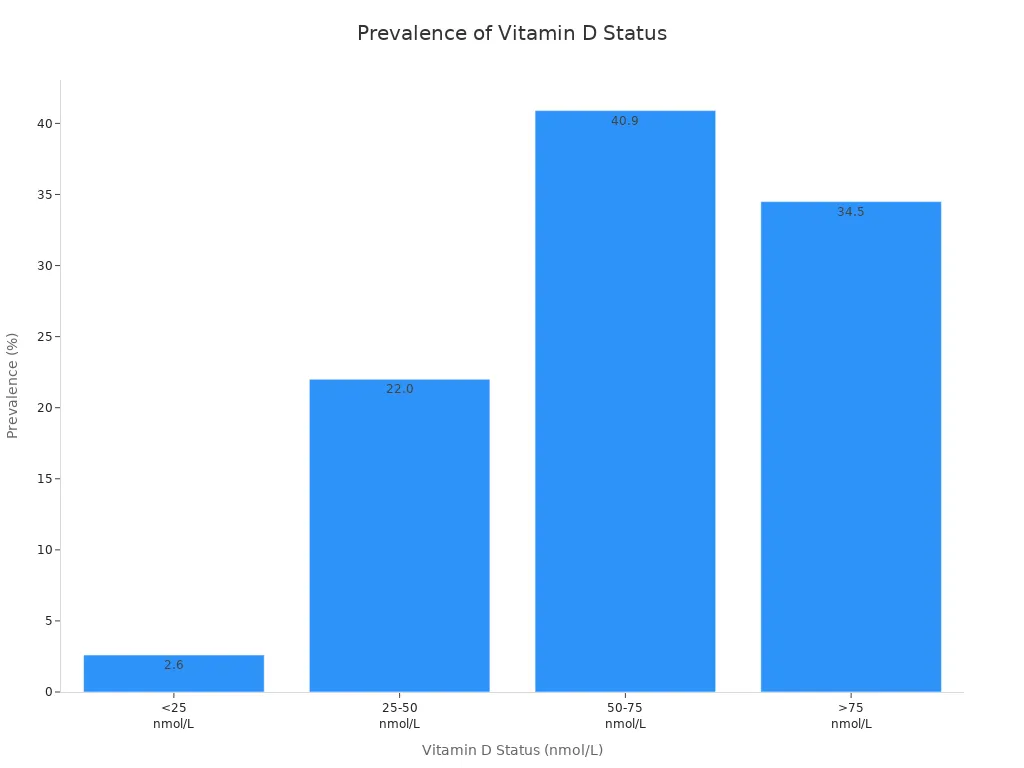How Soon Will You Feel Vitamins Understanding the Timeline
Table of Contents

You probably wonder, how long does it take for vitamins to work? Most people start to notice changes from vitamins in a few days to a few weeks. The timeline really depends on your body and the type of supplement you use. Many things can affect how you respond, like your age, genetics, sex, or even if you smoke.
- Genetic factors
- Age
- Sex
- Environmental toxicants
- Smoking
- Medication use
- Nutrient intake
- Inflammation
- Life-stage
- Body weight
Take vitamin D, for example. Some groups, especially at high latitudes or females, have a higher chance of deficiency, which can slow down results.

Understanding the Timeline for your supplements helps you set realistic expectations.

Understanding the Timeline
How Long Do Vitamins Take to Work
You might ask yourself, “how long do vitamins take to work?” The answer depends on the type of vitamin and your health. When you start taking vitamins, you want to know when you’ll feel a difference. Let’s break down the timings so you can set realistic expectations.
Water soluble vitamins, like vitamin C and the B-complex group, move quickly through your body. Your system absorbs these vitamins fast, and you may notice effects within hours if you have a deficiency. Your body does not store water soluble vitamins, so you use what you need and flush out the rest. If you’re healthy, you might not feel much change, but if you’re low in these nutrients, you could see improvement in just a few days.
Fat soluble vitamins, such as vitamins A, D, E, and K, work differently. Your body absorbs these vitamins with the help of fats and stores them in your tissues. Because of this, fat soluble vitamins take longer to show results. You might need several weeks or even months to notice a difference, especially if you’re correcting a deficiency.
Here’s a quick look at how your body handles water soluble vitamins and fat soluble vitamins:
| Vitamin Type | Absorption Mechanism | Pathway to Bloodstream |
|---|---|---|
| Water soluble vitamins | Absorbed directly into the bloodstream through passive diffusion or active transport | Directly into the bloodstream |
| Fat soluble vitamins | Incorporated into micelles with bile salts, then packaged into chylomicrons | Enters the lymphatic system first |
If you’re trying to fix a deficiency, the timeframe can stretch out. For example, vitamin D may take months to reach healthy levels. Magnesium can work in about a week if you’re low. Multivitamins might help in a few weeks if you’re missing nutrients. Fish oil usually takes 6 to 12 weeks to show benefits.
Why Timelines Vary
Understanding the timeline for vitamins is not always simple. You might wonder why some supplements work fast while others seem slow. The answer comes down to several factors.
- Water soluble vitamins act quickly because your body uses them right away. If you’re missing these vitamins, you’ll probably notice changes in days.
- Fat soluble vitamins need more time. Your body stores them, so you may not feel effects for weeks or months.
- Your health matters. If you’re healthy, taking extra vitamins may not make a big difference. If you’re deficient, you’ll see results faster.
- The supplement you choose also affects the timeframe. Some forms absorb better than others.
Here’s a table to help you understand the timeline for different vitamins and supplements:
| Vitamin Type | Deficient Individuals (Time to Improvement) | Healthy Individuals (Time to Improvement) |
|---|---|---|
| General vitamins | Days to weeks | Little benefit |
| Vitamin B12 | Days to weeks | N/A |
| Multivitamins | Weeks for those low in nutrients | Little change |
| Magnesium | As little as one week | N/A |
| Vitamin D | Several weeks to months | N/A |
| Fish Oil | 6 to 12 weeks | N/A |
You might hear people say that vitamins are a quick fix. That’s a common misconception. Vitamins don’t reverse diseases overnight. If you don’t have a deficiency, taking extra vitamins probably won’t help you feel better. Understanding the timeline helps you avoid disappointment and keeps your expectations realistic.
Tip: If you want to know how do vitamins work, remember that water soluble vitamins get to work fast, while fat soluble vitamins take their time. Stay patient and consistent with your supplements.
If you keep asking yourself, “how long does it take vitamins to work?” or “how do vitamins work?” just remember that your body, your health, and the type of vitamin all play a role. Understanding the timeline makes it easier to track your progress and stay motivated.
Factors Affecting How Long Vitamins Take to Work
When you start taking vitamins, you want to know how soon you’ll feel the benefits. The answer depends on several factors that affect vitamin effectiveness. Let’s look at the main things that change how fast vitamins work for you.
Vitamin Type
Not all vitamins act the same way in your body. Water-soluble vitamins, like vitamin C and the b group, move quickly through your system. You might notice changes in a few days if you have vitamin deficiencies. Fat-soluble vitamins, such as vitamin D, A, E, and K, need more time. Your body stores these nutrients in fat tissues, so you may wait weeks or months to see results. How are vitamins absorbed? Water-soluble vitamins go straight into your bloodstream, while fat-soluble vitamins need fat to help with absorption.
Tip: If you want faster results, check your current vitamin levels. Water-soluble vitamins often show effects sooner, especially if you’re low in those nutrients.
Health Status
Your health plays a big role in vitamin absorption and how fast you notice changes. If you’re healthy, you might feel the effects of vitamins in 2-3 weeks. If you have vitamin deficiencies or medical conditions, it can take longer. People with health issues often use more supplements and choose different types based on their needs. Some vitamins work better for certain conditions, so your health status changes which nutrients help you most.
- People with medical conditions use more supplements.
- The type of supplement depends on your health.
- Some vitamins work better for specific problems.
Genetics also matter. Some people absorb vitamins faster because of their genes. For example, certain genetic variants can lower vitamin C or B12 levels, making it harder for your body to use these nutrients.
| Genetic Variant | Vitamin | Association |
|---|---|---|
| SVCT1 (rs4257763) | Vitamin C | Lower serum levels in GG genotype |
| MTRR (rs162036) | Vitamin B12 | Associated with levels |
| MTHFR (rs1801133) | Vitamin B12 | Higher risk of low levels in TT genotype |
Diet and Consistency
What you eat and how often you take your vitamins matter a lot. The bioavailability of a vitamin depends on your diet. If you eat foods with fat, you help your body absorb fat-soluble vitamins like D and E. The food matrix, or the structure of your food, also affects nutrient absorption. Different forms of vitamins have different bioavailability, so some work better than others.
| Factor Influencing Bioavailability | Description |
|---|---|
| Food Matrix | The structure of the food can affect how vitamins are absorbed. |
| Presence of Fat | Fat-containing foods enhance the absorption of fat-soluble vitamins like D and E. |
| Chemical Forms of Vitamins | Different forms of vitamins can have varying levels of bioavailability. |
If you take your vitamins every day, you give your body a steady supply of nutrients. Skipping doses slows down results. Vitamin absorption improves when you eat the right foods and stay consistent.
Note: Healthy people may notice effects in 2-3 weeks. If you have deficiencies or health problems, it may take longer. Staying consistent and eating well helps your body use vitamins faster.
Timeframe for Common Vitamins and Supplements

You probably want to know how long it takes for different vitamins and supplements to start working. The answer depends on the type of vitamin, your health, and how consistent you are. Some vitamins show results in just a few days, while others need weeks or even months. Let’s break down the timeframe for common vitamins and supplements so you know what to expect.
Vitamin C
Vitamin C acts fast in your body, especially if you have low levels. You might notice more energy or better immune support within a few days to a week. If you take vitamin C every day, your blood levels can improve quickly. People with higher blood sugar (HbA1c) often see bigger changes. Longer use brings better results, so don’t stop after just a few days.
Here’s a quick look at what affects how fast vitamin C works:
| Key Factors | Observations |
|---|---|
| Baseline HbA1c | Bigger improvements if your starting blood sugar is high |
| Supplementation Duration | Longer use leads to more health benefits |
| Study Sample Size | Larger groups in studies show better outcomes |
You may feel the effects of vitamin C supplements in less than a week if you’re deficient. If you’re healthy, you might not notice much, but your body still benefits.
Vitamin D
Vitamin D takes a bit longer to show results. If you have low vitamin D, you usually need about 6 to 8 weeks of daily supplements to bring your levels back to normal. Some people use a high-dose regimen, like 50,000 IU once a week for eight weeks, to fix a deficiency faster. After your levels return to normal, you should keep taking vitamin D to stay healthy.
- Most people see changes in 6-8 weeks.
- High-dose regimens can help correct deficiencies faster.
- Keep taking vitamin D to prevent future problems.
| Age Group | Recommended Daily Dosage of Vitamin D |
|---|---|
| Generally Healthy Adults | 2,000 IU (50 μg) |
| Infants | 400 to 1,000 IU (10 to 25 μg) |
| Children/Adolescents | 600 to 1,000 IU (15 to 25 μg) |
| Older Adults (>50 years) | 2,000 IU (50 μg) |
You may not feel a big difference right away, but your bones, muscles, and immune system will thank you over time. Some studies show that vitamin D and calcium can improve health markers after 6 to 12 months.
Vitamin B12
Vitamin B12 works at different speeds, depending on what your body needs. If you have a deficiency, you might see some changes in just a week. For example, your blood tests may show better levels of certain markers. If you have nerve problems from low B12, it can take six weeks to three months to feel better. Blood cell problems, like anemia, usually improve in about eight weeks.
| Symptom | Expected Time Until Improvement |
|---|---|
| Homocysteine or methylmalonic acid level, or reticulocyte count | One week |
| Neurologic symptoms | Six weeks to three months |
| Anemia, leukopenia, mean corpuscular volume, or thrombocytopenia | Eight weeks |
If you take vitamin B12 supplements every day, you help your body recover faster. You might not notice a big change if you already have enough B12, but your body still uses what it needs.
Multivitamins
Multivitamins give you a mix of nutrients, so the effects can take longer to notice. If you use a high-potency single-ingredient supplement, you may see results sooner. With multivitamins, you need to stay consistent for the best results. Most people notice benefits after several weeks or even months. For example, some studies show mood improvements after 12 months, even though blood levels get better after three months.
| Type of Supplement | Expected Timeline for Effects |
|---|---|
| Single-ingredient, high-potency | More prompt and direct effects |
| Multivitamins and wellness formulas | Benefits with consistent use over time |
| Omega-3 fatty acids and collagen | Long-term strength and resilience |
| Probiotics | Benefits may not be evident for months or longer |
Tip: Don’t expect instant results from multivitamins. Give your body time to adjust and keep taking them every day.
The timeframe for common vitamins and supplements can vary a lot. Some effects show up in days, while others need weeks or months. If you stay patient and consistent, you’ll give your body the best chance to benefit from vitamin supplements.
Signs Your Vitamins Are Working

Physical Changes
You might wonder, how do you know if vitamins are working? Your body gives you clues. Look for signs that show your vitamins are making a difference. You may feel more energy during the day. Your skin can look brighter. Wounds may heal faster. If you had brittle nails or muscle cramps before, those might improve. Some people notice less fatigue or weakness after better vitamin absorption.
Here are common signs to watch for:
- More energy and less tiredness
- Stronger nails and healthier skin
- Fewer muscle cramps
- Better appetite
- Faster healing of cuts or scrapes
- Less pale skin
Doctors also check for signs using blood tests. For example, they look at serum levels for iron, vitamin D, calcium, and vitamin C. These tests show if your absorption is improving. If you still feel weak or notice no changes after several weeks, you should talk to your healthcare provider.
| Vitamin | Physical Signs You Might Notice | What Doctors Check |
|---|---|---|
| Iron | Less fatigue, stronger nails | Serum iron, ferritin |
| Vitamin D | Better bone strength, growth | Serum 25(OH)D |
| Calcium | Fewer cramps, steady heartbeat | Serum calcium |
| Vitamin C | Faster healing, less gum swelling | Serum vitamin C |
Tip: If you do not see any signs after a month, ask your doctor about your vitamin absorption or possible deficiencies.
Mental Well-Being
Vitamins can help your mind as well as your body. You may notice signs like a better mood or feeling less stressed. Some people feel more friendly or less lonely after taking vitamins for a while. If you ask yourself, how do you know if vitamins are working, pay attention to your feelings each day.
Here are signs linked to mental well-being:
- Improved mood
- Less stress or anxiety
- Feeling more social or friendly
- Lower feelings of loneliness
Studies show that multivitamin supplements can boost feelings of friendliness and reduce stress after about 12 weeks. Males sometimes report less emotional loneliness. These signs may take time, so keep track of your feelings over several weeks.
| Findings | Description |
|---|---|
| Improvements to mood | Enhanced feelings of friendliness after 12 weeks of multivitamin use |
| Reduction in stress | Lower perceived stress reactivity after supplementation |
| Decrease in loneliness | Significant reduction in emotional loneliness, especially in males |
Note: If you do not notice any signs of improvement in your mood or energy after a few months, check with your healthcare provider. Sometimes poor absorption or other health issues can slow progress.
Tips to Maximize Vitamin Effectiveness
Best Practices
You want your vitamin regimen to work as well as possible. Start by choosing supplements that have been tested for safety and quality. Look for certifications from trusted organizations like ConsumerLab, US Pharmacopeia, or NSF International. These marks show that your vitamins meet high standards.
Follow the recommended dietary allowances for each vitamin. Taking more does not always mean better results. Adjust your vitamin regimen based on how you feel and what your doctor suggests. Pay attention to the chemical form of your vitamins. Some forms absorb better than others, so check the label before you buy.
Take fat-soluble vitamins with food that contains some fat. This helps your body with absorption and boosts effectiveness. For example, studies show that even 3 grams of fat per meal can help your body absorb pro-vitamin A carotenoids. The amount of fat you need may change based on your body, but eating a balanced meal helps.
Dr. Oppezzo says, “It’s important to approach supplements with a healthy dose of skepticism and informed judgment. Not all supplements are inherently harmful; some can offer significant benefits when used appropriately.”
Here is a quick checklist for an effective vitamin regimen:
- Choose certified supplements.
- Stick to recommended dosages.
- Take vitamins with food, especially fat-soluble ones.
- Adjust your vitamin regimen as needed.
- Understand how your vitamins interact with other nutrients or medications.
Common Mistakes
You might make simple mistakes that lower the effectiveness of your vitamin regimen. Skipping doses or stopping your vitamins too soon can slow down results. Consistency is key for an effective vitamin regimen.
Many people forget that fat-soluble vitamins need dietary fat for proper absorption. If you take vitamins A, D, E, or K without food, your body may not absorb them well. This mistake can make your vitamin regimen less effective.
Some people think supplements never interact with medications. That is not true. Certain supplements can change how your medicine works. Always check with your doctor before starting a new vitamin regimen.
Expecting instant results is risky. Reports show that rushing or taking too much can cause serious health problems, like heart or kidney issues. Supplements rarely give quick fixes. You need patience and a steady routine for the best effectiveness.
Here is a table showing why inconsistent use can hurt your results:
| Limitation Type | Description |
|---|---|
| Inconsistent Doses | Changing doses can affect how well vitamins work. |
| Differing Follow-Up Periods | Not tracking progress makes it hard to see benefits. |
| Lack of Control Factors | Ignoring diet and sun exposure can change vitamin levels. |
| Duration of Interventions | Short use may not show real effectiveness. |
Tip: Stay patient and consistent with your vitamin regimen. Give your body time to absorb and use the vitamins for the best results.
You might notice changes from supplements in just a few days, but some take weeks or even months. Many things affect your results, like your health, the type of supplement, and how often you take it.
- Water-soluble types usually work in days.
- Fat-soluble ones may need weeks or months.
- Fixing a deficiency often takes up to three months.
Stay patient and keep track of how you feel. If you do not see progress, talk with your healthcare provider. Long-term use can help lower your risk of falls, improve memory, and support your health over time.
| Benefit | Description |
|---|---|
| Reduced risk of falls | Vitamin D can help lower your chance of falling or breaking a bone. |
| Better memory | Some supplements may boost memory after years of use. |
| Lower blood pressure | Vitamin D may help lower blood pressure in people who need it. |
FAQ
How long should you take a supplement before expecting results?
You usually need to take a supplement for at least two to three weeks before you notice any changes. Some people feel results sooner, but others may need more time. Stay patient and keep your routine steady.
Can you take more than one supplement at a time?
Yes, you can take more than one supplement. Just make sure you do not go over the recommended amounts. If you have questions, ask your doctor or pharmacist before you start a new supplement.
What should you do if you miss a supplement dose?
If you miss a supplement dose, just take your next one at the usual time. Do not double up. Missing one dose will not hurt your progress, but try to stay consistent for the best results.
Are there any signs you should stop a supplement?
Watch for side effects like stomach pain, headaches, or rashes. If you notice anything unusual, stop the supplement and talk to your doctor. Your safety comes first.
Tip: Always read the label and follow the instructions for each supplement.

Poseidon
Master of Nutritional Epidemiology, University of Copenhagen, Herbal Functional Nutrition Researcher
Focus: The scientific application of natural active ingredients such as Tongo Ali, Horny Goat Weed, and Maca to sexual health and metabolic regulation.
Core Focus:
Men: Use a combination of Tongo Ali (an energizing factor) + Maca (an energy reserve) to improve low energy and fluctuating libido.
Women: Use a combination of Horny Goat Weed (a gentle regulator) + Maca (a nutritional synergist) to alleviate low libido and hormonal imbalances.
Stressed/Middle-Aged Adults: This triple-ingredient synergy supports metabolism, physical strength, and intimacy.
Product Concept:
Based on traditional applications and modern research (e.g., Tongo Ali promotes testosterone-enhancing enzyme activity, and icariin provides gentle regulation), we preserve core active ingredients and eschew conceptual packaging—using natural ingredients to address specific needs.
Simply put: I'm a nutritionist who understands "herbal actives." I use scientifically proven ingredients like Tongo Ali, Epimedium, and Maca to help you make "sexual health" and "nutritional support" a daily routine.
